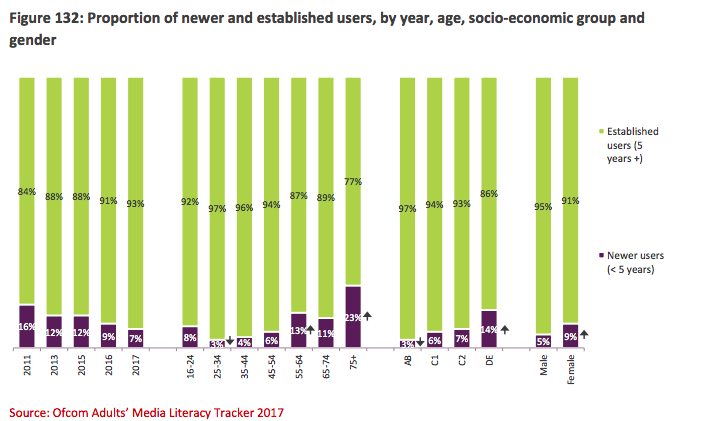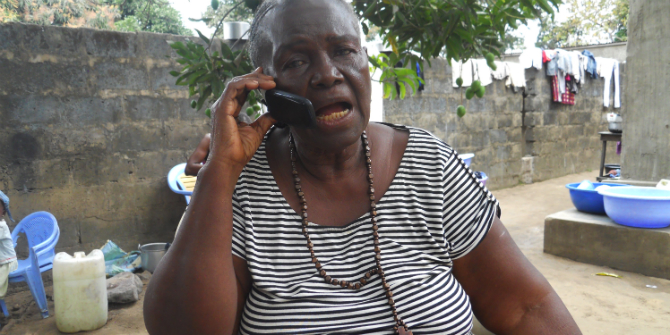 Gendered life patterns and socialisation may negatively affect women’s confidence in using digital technology – particularly older women with lower socio-economic status. These are some of the findings from two reports carried out by Ofcom, the UK’s communications regulator, and the Good Things Foundation, into digital inclusion and literacy. In this post Kate Gilchrist asks what this means for how parents and grandparents support their children in a digital age and argues that policy makers must take such factors into account. Kate is the editor of the Parenting for a Digital Future blog and is a PhD researcher in the Media and Communications department at LSE. [Header image credit: Alexander Dummer on Unsplash]
Gendered life patterns and socialisation may negatively affect women’s confidence in using digital technology – particularly older women with lower socio-economic status. These are some of the findings from two reports carried out by Ofcom, the UK’s communications regulator, and the Good Things Foundation, into digital inclusion and literacy. In this post Kate Gilchrist asks what this means for how parents and grandparents support their children in a digital age and argues that policy makers must take such factors into account. Kate is the editor of the Parenting for a Digital Future blog and is a PhD researcher in the Media and Communications department at LSE. [Header image credit: Alexander Dummer on Unsplash]
Ofcom’s latest survey of UK adults reveals a gender gap in internet inclusion and digital literacy. Newer users of the internet (defined as those who have used it for less than five years) were much more likely to be women, as shown in the chart below – 9% of female users were newer users, compared to 5% of men. The gender gap intersects with age and socio-economic status (SES): new users are more likely to be older (23% of those age 75 or older – a group more likely to be women – were new users of the internet) and from a lower SES household (‘DE’ households had the most new users at 14%). Examining these results in combination with an in-depth qualitative study carried out by the Good Things Foundation [1], this post highlights how gender impacts upon digital literacy to explore what this might mean for families living in a digital age and children’s learning.
The confidence gap: gendered life patterns
While Ofcom’s analysis shows women are increasingly using digital technology, it also shows they have lower digital literacy skills – 66% of new users lack an awareness of how search engines are funded, and 51% only use one device, a mobile phone, to go online, which has been linked to lower digital skills and lack of engagement online. Perhaps unsurprisingly such users also showed very low levels of confidence online, with only 12% of new users saying they felt ‘very confident’ using the internet, compared to 52% of those who had been using the internet for more than five years.
The Good Foundation’s I Am Connected study was drawn from 27 interviews of people aged 55-93, focus groups and observations to understand where older people are both problematically and unproblematically excluded from the internet, and how this may interact with other forms of a social exclusion and disadantage.
Both reports found women face a ‘confidence gap’ due to gendered life patterns and the impact of gendered socialisation. Women often said that time spent out of the workplace was the reason for their lack of confidence in using digital devices. Several described how moving out of the workplace to start a family, rather a lack of desire to engage with such technologies themselves, had made them fearful:
“You left school, went to work for a couple of years, you had your family and that was it. That was your life. I’d always wanted to use a computer. But too [I was] frightened, too scared…You lose your confidence.” Woman, aged 55-64, SES group D, ‘I am Connected’ Report
Exposure versus attitudes
The Good Things Foundation report noted that while many people, particularly (but not only) women, cited time out of work, or simply less contact with digital technology at work, to explain their lack of confidence, there was little actual evidence of a connection between use of digital technologies at work and digital skills. Instead, they observed evidence suggesting “that lack of exposure [in the workplace] could be the result rather than the cause of fear or lack of interest.” For example, those with lower levels of educational attainment were also more likely to be less inclined to want to use the internet.
Taking class into account
Yet the impact of societal expectations for women to leave employment or education and to focus on raising families, or for them to choose a particular line of work, was much more pronounced among women from lower SES groups:
“When I left school you didn’t go to college unless you had money. Or somebody sponsored you to go. I wanted to be a nurse or a hairdresser but my Mum was putting my brother through being a mechanic … so she couldn’t pay for two of us to go to college. And when I went to school, literally, girls were not encouraged to do like girls are encouraged now.” Woman, aged 55-64, SES group D, ‘I am Connected’ Report
“I thought it would be hard, you know, I’d get frustrated or annoyed with it…I had my children so I just stayed at home with them.” Woman, aged 65-74, SES group D, ‘I am Connected’ Report
Those who did not go online, but had learned about it from watching others use it or being told about it, were likely to develop a more negative attitude as a result. This was the case even for those who had shown interest in improving their digital skills and had begun learning. This then compounded “caution, anxiety, resistance, and lapses” in their development of digital skills.
So an initial lack of experience online, brought about by multiple and complex structural social factors, may be reinforced by gaining secondhand knowledge of such technologies. This would suggest such older women require additional encouragement and support when it comes to developing their online skills.
Implications for digital literacy
Extensive research has shown that parents play a vital role in supporting children’s digital engagement and learning. But what are the implications of this for grandparents helping to improve children’s digital literacy skills – particularly in Africa and in Latin America and the Caribbean, where children are more likely to be raised by grandparents or other extended family members? If older people, especially older women, lack of digital skills this could hamper their ability to support their grandchildren’s digital learning. Current policies to support older users could be more closely targeted towards grandmothers from lower socioeconomic groupings or with lower levels of education.
Tackling gendered patterns of exclusion
It is important to consider how time spent out of the workplace to care for children – a role which is still disproportionately taken up by mothers despite more women moving into the workplace – may be detrimental to parents’ and grandparents’ digital skills and confidence. Policy makers should consider how such life patterns may reinforce deeply held attitudes and fears surrounding such technologies and learning. Gendered expectations and life experiences may intersect with social class to further compound such gaps in digital literacy and digital inequalities.
While the impact of gender socialisation and life patterns may be difficult to alter through policy interventions, it is vital that measures consider such issues when tackling internet inclusion and digital literacy. Based on the two reports, digital skills or confidence-building workshops or measures should be targeted at the following groups:
- Older women from lower socio-economic groups
- Those who have taken time out of the workplace
- Those who have worked in jobs which require fewer or no digital skills
- Those with lower levels of education
- New internet users who have lapsed in their learning
Notes
[1] Both studies were presented in July at Ofcom’s headquarters. The Ofcom survey drew on data collected from 5,786 UK adults in 2017 and was conducted alongside its long-term qualitative study Adults’ Media Lives in partnership with The Knowledge Agency. This annual study looks at how and why people use digital media in their daily lives, and in particular how this varies between ages. The Good Things Foundation’s ‘I am Connected’ report looked at how older people use digital technologies.
This post gives the views of the author and does not represent the position of the LSE Parenting for a Digital Future blog, nor of the London School of Economics and Political Science.






